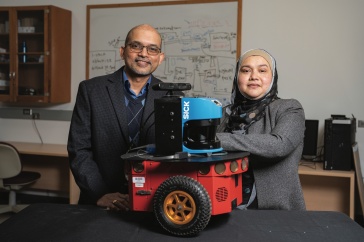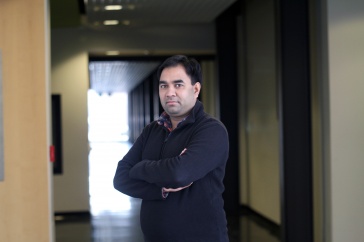Two UNH assistant professors, Marko Knezevic of mechanical engineering and Qiaoyan Yu of electrical and computer engineering, have received prestigious Faculty Early Career Development Program, or CAREER, awards from the National Science Foundation (NSF). The grants of $500,000 support early-career faculty who “have the potential to serve as academic role models in research and education and to lead advances in the mission of their department or organization,” according to the NSF.
Chuck Zercher, interim dean of the College of Engineering and Physical Sciences, congratulated Knezevic and Yu, both CEPS faculty. “Their exceptional contributions to the research enterprise of the University of New Hampshire will not only provide educational opportunities for UNH students, but will continue to advance UNH as a leading research institution,” he said. “We are pleased that we are able to attract such talented faculty members to UNH.”

Improved fuel efficiency of automobiles and aircraft depends, in part, on lighter, stronger materials. But how do you create those materials, and how do you know when they’ll fail? To help him answer those questions, the National Science Foundation has awarded Marko Knezevic a CAREER award.
Knezevic, an assistant professor of mechanical engineering at UNH, is particularly interested in materials such as titanium and magnesium alloys, both strong, lightweight metals with a hexagonal structure. “They have the potential for reducing weight in both aerospace and automotive industries,” he says. “But industry hasn’t been adopting much of them mainly because their fracture behavior is not well understood.” Article

Qiaoyan Yu, assistant professor of electrical and computer engineering, received a National Science Foundation (NSF) CAREER award for "Proactive Defense Methods for Chip Integrity and Security."
“Unreliable and insecure chips threaten homeland security and citizen safety, especially for the mission-critical applications in the military, government, medical and transportation fields,” she explains. “The outcomes of this project will facilitate the implementation of trustworthy chips for both mission-critical and commercial applications. More specifically, this project develops proactive defense methods to resist security threats appeared at the design phase of integrated circuits.” Article
Learn From the Best
Interested in studying engineering and the physical sciences? Put yourself among some of the top minds in the nation at UNH. Explore CEPS degree options here.
-
Written By:
Beth Potier | UNH Marketing | beth.potier@unh.edu | 2-1566



















































